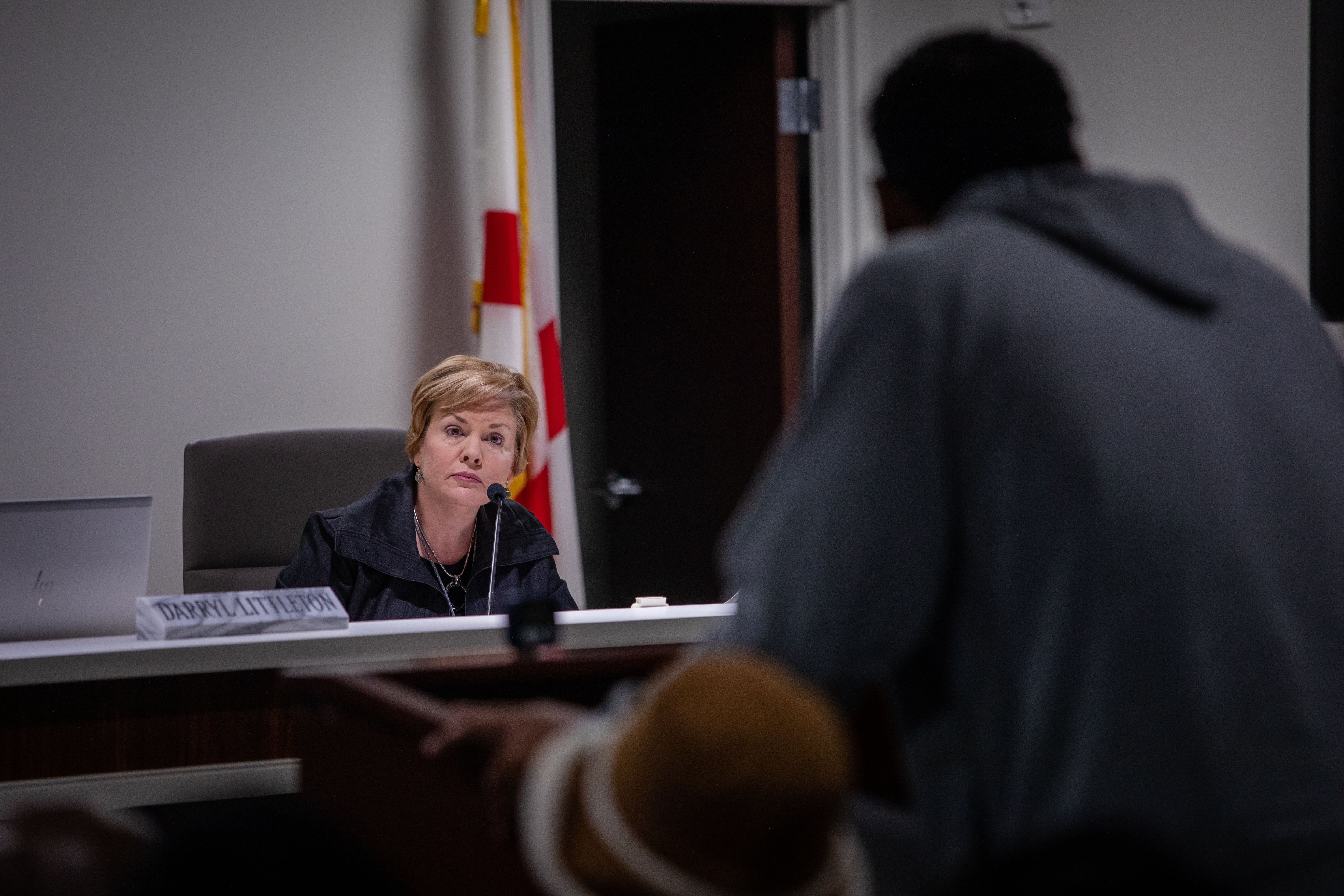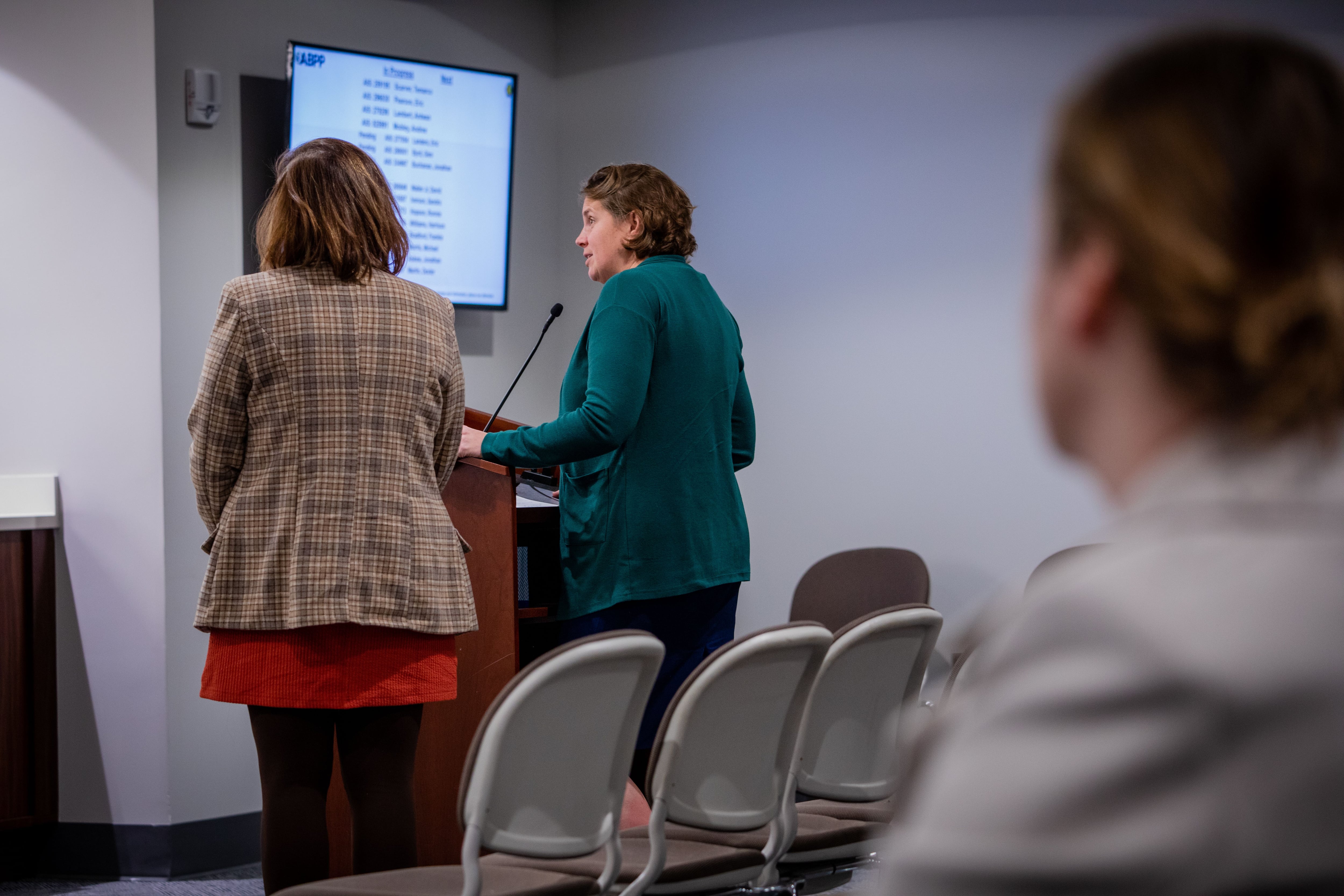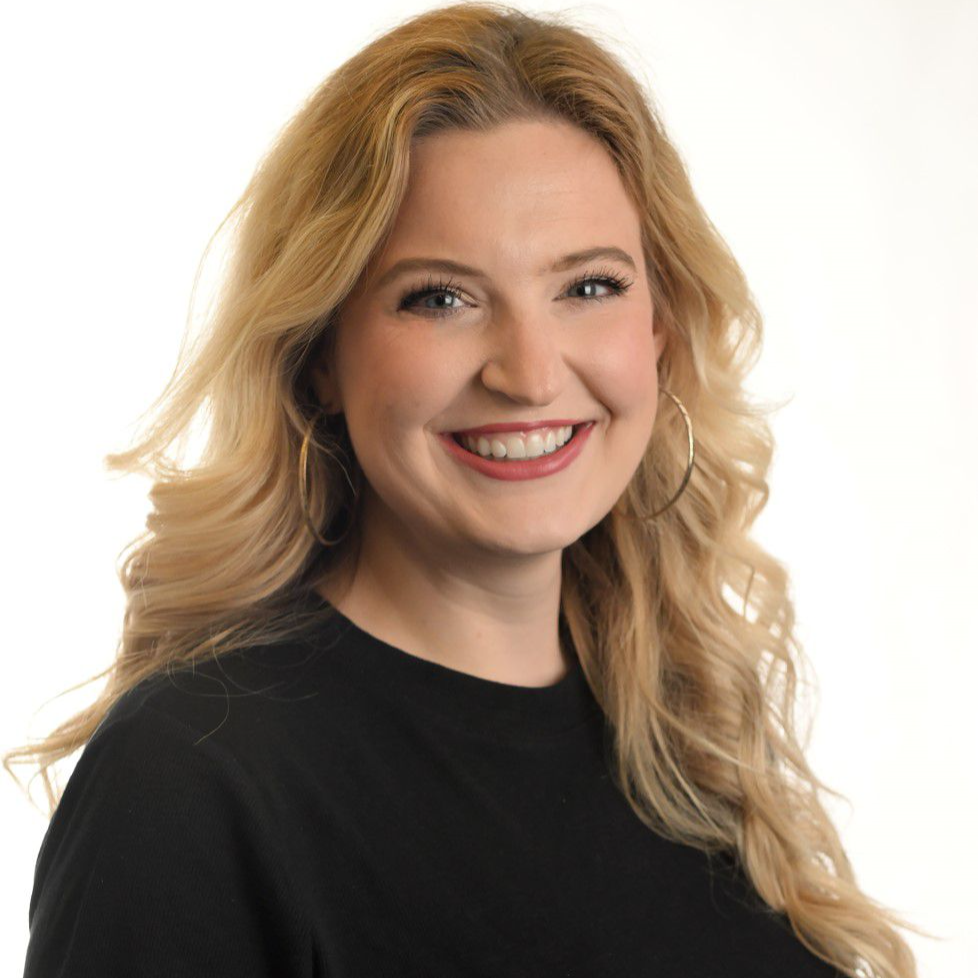Robert George didn’t mean to kill Mary Dale.
No one argues that fact.
He was drunk that day in 1993, arguing with family members at a big gathering in Monroe County when he shot at the ground to scare someone. But the bullet didn’t stop, and struck 11-year-old Mary.
She died a few days later.
And George was sent to prison for life.
Now 85 and in failing health, George faced an unusually long, contentious parole hearing Wednesday morning, showing just how hard it is to win the support of Alabama’s parole board.
George wasn’t present at the hearing, as Alabama inmates aren’t permitted to attend. But he said in a pre-recorded video played at the hearing, “That was something I didn’t mean to do, because I ain’t never hurt nobody or anything like that. It just was an accident and not something I meant to do.”
The vast majority of eligible prisoners in Alabama do not get parole. The parole rate dropped to just 8 percent last year, despite overcrowding in Alabama prisons.
George told the three-member parole board how sorry he was about Mary’s death. He asked her mother for forgiveness and said, “At the age I am, all I can do now is pray … if I leave here I can have a good resting place.”
Mary Dale’s mother, Joyce Dale, opposed George’s parole at his last hearing in 2022. But after learning that George hadn’t had a drink since the day he accidentally shot her daughter 31 years ago, and his positive impact in prison, she changed her mind.
While Joyce Dale wasn’t present at Wednesday’s hearing, she sent a recorded video that was played on a screen.
“I know I said the last time that I want him to stay in prison. But God has brought me through…I forgive him because I’m a child of God and I would like to just let him out of prison just to let him see some daylight,” said Joyce Dale. ”I’m asking you all please, please release the man. In Jesus’ name, thank y’all.”
Normally, parole hearings last a few minutes. But George’s ran two and a half hours, much of it consumed by board Chair Leigh Gwathney’s questioning.
Gwathney, who votes no more often than her colleagues, repeatedly grilled George’s attorneys about the victim’s mother and that decision to forgive.
Robert George
After pleading guilty to manslaughter in the spring of 1994, George was sentenced to life in prison. He got the harsh sentence under the state’s old Habitual Felony Act Offender Laws because he had two priors stemming from a theft from an unoccupied building.
A representative from the Alabama Attorney General’s Office spoke in opposition to George’s release on Wednesday, citing his priors and other crimes he was arrested for, but not convicted of.
In his three decades behind bars, court records show, George has only had three disciplinaries: One for refusing to work in 1998 and two for violating rules in 2005 and 2007.

In a court filing seeking resentencing, which a Monroe County judge denied in February, George’s lawyers included copies of certificates he’s earned over the years for small engine repair and auto mechanics training, along with eight-years’ worth of “peer trainer” certificates from a community college.
According to George, he was addicted to alcohol at the time of the shooting. He’s been sober since that day.
Seven officers at the south Alabama prison where George has spent most of the last 30 years wrote letters to that court asking for him to be released, calling him a “model inmate” and a “positive example of a successfully rehabilitated man.”
A Birmingham-area physician wrote a letter to the parole board, saying that George’s health should be considered for “compassionate release.” According to court records, George has extensive medical issues, including COPD and diabetes. He runs out of breath making his bed, said Cobb.
“His continued incarceration not only exacerbates his health issues but also represents an unnecessary and disproportionate punishment,” wrote Dr. Jimmie Harvey, an oncologist.
But the AG’s representative said she thought the Monroe County District Attorney’s Office believed Joyce Dale was being pressured to support George. She presented no correspondence from the DA’s Office, or anyone involved, to support that statement.
Joyce Dale
Gwathney spent the majority of the hearing questioning George’s lawyers, Lauren Faraino and former Alabama Supreme Court Chief Justice Sue Bell Cobb, about why the victim’s mother came to her decision.
“Who had the very first contact with Ms. Dale?” Gwathney asked Cobb.
“Who participated in this affidavit she purportedly signed?”
Cobb now runs a nonprofit legal group that focuses on getting parole for sick inmates, and Faraino owns her own law firm, along with leading the Woods Foundation. The two teamed up on the case.
Faraino said she visited Joyce Dale at her south Alabama home last year to ask her feelings on George’s release and then formed a relationship with the grieving mother over several months. Eventually, Joyce Dale met with Faraino and signed an affidavit supporting George’s parole.
Cobb answered the chairperson’s questions, saying Joyce Dale had chosen to forgive George – the Dale family and George are distantly related – and wanted her feelings known at this hearing. She didn’t come because she couldn’t handle being interrogated for her decision, Cobb said.
Many of Gwathney’s questions related to the interactions that Cobb’s group, Redemption Earned, and Faraino had with the mother, so Gwathney asked Faraino to come to the podium.
She asked about the initial meeting at Joyce Dale’s home.
“What did you tell her about who you were?” questioned Gwathney. “Did you tell her you were representing Mr. George to get him out of prison?”
Faraino answered yes, and said Joyce Dale continued to speak with her even after knowing she was an attorney for George.
“What kind of home did she live in?”
“Have you done any kindnesses for her the past year?”
“How many times did you initiate conversation? What percentage?”
“Who was there when she signed the affidavit?”
She questioned at which UPS store the notary signed that form, how Joyce Dale was transported there and by whom. She asked about Joyce Dale’s own attorney and who was paying his legal bills (he’s working the case pro bono, said Faraino).
Following the questioning of Faraino, Gwathney turned to Cobb once again.

She asked if it was Redemption Earned’s “standard practice” to show up to victims’ homes, and if the former justice considered a driveway a public space.
Darryl Littleton and Gabrelle Simmons, the other two board members, sat quietly throughout Gwathney’s lengthy questioning.
Littleton followed up when they finished. “Judge Cobb,” he said, “Is (Joyce Dale) just trying to have her voice heard today?”
Yes, Cobb answered.
Simmons asked no questions of Cobb, Faraino, or a nurse who spoke about George’s rapidly deteriorating health.
Littleton also remarked on the video of Joyce Dale that was played at the hearing. “In my observation, it did not look like a hostage video in wartime.”
In the end, the board split, voting 2-1 to parole George. Gwathney voted no, saying she would vote to set him off for another five years, the maximum amount of time before he could have another parole hearing. He would be 90.
What’s next?
When asked following the hearing, the board members declined to comment for this story.
George’s stepdaughter, who lives in Florida, plans to care for George when he’s released, to give him “all the love and affection he can stand,” she wrote in a letter to a Monroe County judge.
“Dad was a great dad to me and my brother- much more than I can say about my actual dad. He was absent, but my dad George was there for us… and I am overwhelmed with the fact that he might finally be going to come home.”
George’s wife died in 2019, but her kids still need him.
“There’s nothing in the world I want more than to see Dad’s face again,” his stepdaughter wrote.
Denied: Alabama's broken parole system
- Alabama lawmakers distance themselves from parole board, families say loved ones ‘stuck for life’
- Alabama argued to keep Lowe’s shoplifter in prison. Roy Moore came to his defense.
- Alabama paroles hit historic lows last year: Here’s what changed amid scrutiny in 2024
- He missed a meeting and got sent back to prison. Now Alabama is giving him another chance.
- They want to ‘die with a clear conscience.’ But in Alabama, pardons are harder to come by
This project was completed with the support of a grant from Columbia University’s Ira A. Lipman Center for Journalism and Civil and Human Rights in conjunction with Arnold Ventures.
